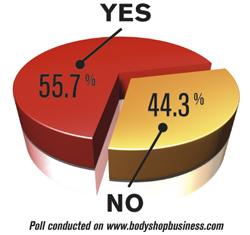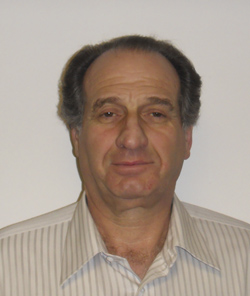
YES
By Lee Amaradio Jr.
A labor rate survey’s intended purpose is to establish a starting point so labor rate negotiations can begin. It’s intended to create a floor to build upon, not create labor rate caps. Today, it’s not serving any purpose other than keeping costs down for insurance companies.
The major problem with the present labor rate survey system is that insurers have been able to create results that benefit them without any regard for those who are performing collision repairs or the unique individuality of each repair facility in the industry.
Today, the description “usual and customary” is used so often that it’s regarded as the law. Usual and customary means nothing unless you’re comparing exact processes with two exact facilities. But with so many differences between each shop and its individual procedures, this description is irrelevant. Insurers have been able to create the illusion that labor rate surveys are designed to regulate the cost of anything related to the repair.
The present survey system can be compared to examining a $1 bill and a $20 bill and saying that they have the same value because they’re both green, recognized as United States currency and have the picture of a president on them. This is how stupid it is to say that all body shops should be paid the same labor rate.
Even though labor rate surveys were intended to create nothing more than a starting point for negotiations, we now allow insurers to use them to end all negotiations. They’re supposed to be used for the beginning, not the end. The fact that today’s surveys have been skewed to favor insurers should be no surprise. They’re being used in an unethical manner to create a ceiling for labor rates instead of the floor they were intended for. Mitigating the damage is one thing but price fixing is another.
After researching everything about current labor rate surveys, I’ve concluded the following:
• Surveys aren’t to be trusted; they must be approached with a critical eye.
• Surveys can be skewed to create or imply the results that the party doing the survey is looking for.
• Surveys can be damaging because they’re typically deemed to be factual when in reality they’re not.
• Surveys are never searching for the truth but for what the entity conducting the survey wants to call
the truth.
• Surveys in the collision repair industry should be abolished because we’re too diversified of an industry for any survey to ever be accurate.
Today’s surveys are used only as price-fixing tools that lump all shops together. They’ve even been used as the foundation to control the repair process itself. There’s nothing “usual and customary” in an industry that has no absolutes except with anything but the cost.
Whenever we allow cost to control the repair process, we’re doing a disservice to the American consumer. When “cost control without standards” is the driving force that dictates the repair process, we’re putting consumers in a dangerous position.
Bogus labor rate surveys have been used to regulate an entire industry and keep costs down. These surveys are manipulated for one outcome only, and that’s to control cost. They’re not used for informational purposes to determine what’s reasonable and fair. These surveys are so distorted today that there’s nothing reasonable and fair about using them to determine any base by which negotiations can begin.
As an industry, we need to disregard these surveys and stop allowing insurers to misuse them against us and our customers. It’s the shop owner who must determine what his or her fair and reasonable labor rate is and be able to back it up in court. No longer should our industry adhere to this bogus labor rate regulating fiasco. Why is my labor rate determined by what some mobile bumper repairer or detail shop charges? Until they start comparing apples to apples, labor rate surveys mean nothing. They’re just another bill of goods we’ve accepted as the norm that really have no foundation and would crumble if contested properly.
So what should we do? I think each shop should charge a fair and reasonable labor rate based on its own individual facility, its training, equipment and certifications. What you charge is your business, and no one has the right to say you’re unreasonable without comparing your charges with the charges of several other shops that are exactly like you in terms of training, equipment and facility.
 NO
NO
By John Petrarca
Labor rate surveys are the only way to guarantee a fair marketplace for
consumers and body shops alike, and to prevent insurance companies’
price fixing tactics. But as always, in this complicated industry, the
devil is in the details.
In Rhode Island, we’ve fought long and hard as an industry to establish
a system that protects the consumer while preserving a free market that
was quickly disappearing due to insurance company control using the
direct-repair system. We believe Rhode Island could be a model for the
rest of the country, with minimum standards for auto body repair shop
licensure, P-page laws for fair and reasonable compensation, technician
certification requirements and, most importantly, labor rate surveys.
After the Auto Body Association of Rhode Island (ABARI) demonstrated
that the labor rate paid by insurance companies in its state had
increased a mere $6 over 20 years, the legislature passed a labor rate
survey law that was distinguishable and preferable to other models. In
Rhode Island, an insurer cannot include, in its analysis of the
prevailing auto body labor rate, the rates charged by a direct-repair
facility with which it has a contract. These DRP shops were
specifically excluded since their rates were discounted for referrals
and thus had no place in a market analysis. Also, the surveys must be
conducted using a standardized questionnaire created by the Department
of Business Regulation, which all insurers are required to send to all
fully licensed body shops. Finally, the law requires that insurers base
the labor rate on an analysis of the questionnaires received from the
shops without the use of extraneous information.
When all of these factors are considered, the labor rate survey process
can be used as a valuable tool for protecting competition and also
shielding the consumer from insurer price-fixing tactics that
ultimately lead to substandard repairs and eliminate safeguards that
should exist for the motoring public. The implementation of minimum
shop standards, technician certification, P-page requirements and
various anti-steering laws serves to protect the public and provide a
level playing field in which a properly drafted labor rate survey law
can effectively promote and preserve competition while ensuring fair
compensation.
The insurance industry lobbied long and hard against this labor rate
survey law because it was keenly aware that the law would restore a
free market system and give small business owners a proper say in the
rate they charge. The louder insurers objected, the more evidence ABARI
produced of the detrimental results of insurer price fixing over
decades, from substandard repairs to well over 100 shop closings in
less than a decade. In the same way auto dealers fought manufacturers
decades before to ensure payment of reasonable rates charged for
warranty work, ABARI lobbied to protect the rights of its members to
exist in a free market economy.
Lee Amaradio’s opinion that labor rate surveys should be abolished is
understandable considering the law he’s referring to and the system
he’s operating in. It’s clear that one cannot view the value of a labor
rate survey law in a bubble – all factors of the market, the industry
and the survey law itself must be considered to determine if the law
provides a fair and proper basis for use in the industry. The
interaction between the insurance and collision repair industries is
unique and requires everyone to think outside the box to promote
reasonable solutions that are fair to both shops and consumers.
In Rhode Island, we’re confident that we’re on the right track, and a
Superior Court judge thought so as well when she agreed with ABARI’s
position and stated that the law was intended to protect consumers by
ensuring a true market rate. This is the ideal. We believe we’re close
to it, and we’ll continue to protect the progress we’ve made in
ensuring that all shops have an opportunity to be successful and
prosper without the heavy hand of the insurance industry pulling the
strings.
Our industry must be vigilant to protect our livelihood and future
existence. This can be accomplished by always looking to improve the
laws that protect us and our customers. If it’s not working, fight to
change it. But don’t throw away progress because you may not think it’s
good enough – it’s still progress.













